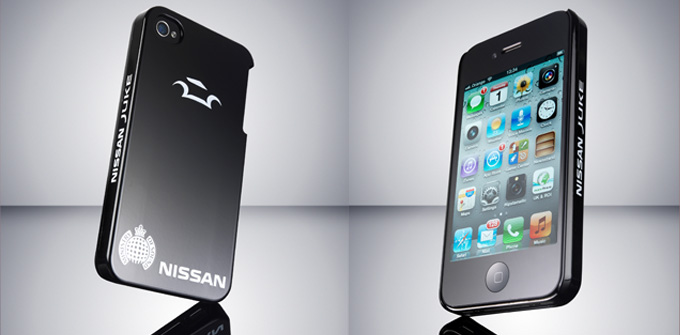Nissan and Tokyo University today announced the latest piece of must-have kit for the iPhone – a ground-breaking self-healing iPhone case.
The Nissan ‘Scratch Shield’ features the Japanese car maker’s pioneering self-healing paint finish, a pioneering paint technology developed in 2005 and already used on a number of Nissan and Infiniti models around the world.
Now this ground-breaking technology has been applied to a product that’s prone to scratches through everyday use – the smartphone – with the new Scratch Shield case, Nissan says iPhone-lovers can keep their keitai looking at its best for longer.
Bob Laishley, Overseas Programme Director Business Development for Nissan in Europe, said: “We like to think laterally by taking the great innovations we’ve got from an automotive point of view, and looking at how they could be applied to improve everyday issues.”
“The Scratch Shield iPhone case is a great example of us taking a Nissan automotive technology that has had a huge impact for our customers, and then shifting the boundaries to apply it to another everyday product.”
Developed by Nissan in collaboration with University of Tokyo and Advanced Softmaterials Inc., the unique Scratch Shield paint finish was initially designed for automotive use and is available on the Nissan Murano, 370Z and X-Trail along with the Infiniti range of vehicles.
Now, for the first time ever this technology is being trialled on a non-automotive product in Europe, with the Nissan Scratch Shield iPhone case.
The case has been designed using several automotive engineering innovations to deliver a more durable and long-lasting paint coat, and closely fitting, tight case.
The case has three key benefits: the highly flexible and elastic properties of Scratch Shield paint technology allows fine scratches to quickly mend themselves; its tactile gel-like rather than glossy surface is more scratch-resistant than conventional paint and provides a better grip; and the case itself is made of ABS plastic – a high grade substance widely used in the automotive industry which is more rigid and robust than other plastics.
The outer ‘paint’ is made from polyrotaxane, which means that when damage occurs to the coating in the form of a fine scratch, the chemical structure is able to react to change back to its original shape and fill the gap – ‘healing’ the blemish.
An initial batch of prototypes of the innovative Scratch Shield iPhone cases has been produced by Nissan for BETA testing with selected journalists and customers, but if demand proves strong, (as we suspect it will) Nissan will put the cases on general sale later this year.
“We’re really excited about the possibilities provided by this technology,” said Laishley.
“In Japan, we’ve already linked up with world-leading mobile operator NTT DoCoMo to allow them to use the Scratch Shield technology on its Style Series N-03B mobile phones, and we think this technology has real scope beyond the automotive world.”
“We’re passionate about innovations that get people excited, and that means not being restricted to one industry or genre,” he continued.
Nissan has been licensing its unique technologies for various non-automotive applications since 2004.
Other technologies that have been licensed include its Miniature Thermal Imaging Sensor: initially designed to make driving at night safer by detecting the presence of people even in places not illuminated by the car’s headlights; the technology has been licensed to create a device which allows customers to monitor heat generation, or collect temperature readings via infrared sensor.
Nissan official site: www.nissan.co.jp
Tokyo University: www.u-tokyo.ac.jp









